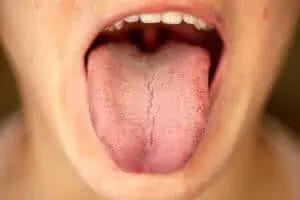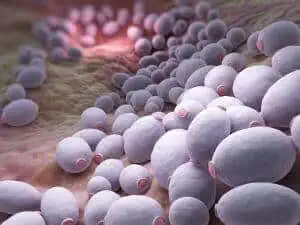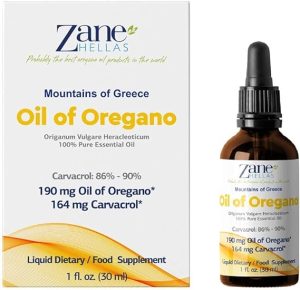If you’re wondering about oral thrush treatment options, you’re in the right place. There are various possible ways to get rid of oral thrush, either with medicine prescribed by a doctor or with one of many home remedies. But how do you know which one to try first?
If you’ve noticed you have some oral thrush symptoms then it’s good to address it straight away. Oral thrush is a condition of the mouth that involves an overgrowth of yeast fungus. Some people get severe symptoms and others have it mildly and then find it disappears. The good news is that it is treatable, and no matter why you have it, there’s likely something you can do to get rid of it or at least ease the symptoms from home.
In this article, we’ll talk all about mouth thrush, what causes it, how to treat it at home and how to prevent it from happening in the first place. We hope this information gives you peace of mind if you have this condition and helps you get rid of it once and for all.

Save the trip to your NHS dentist and speak to a certified dentist right now online. Visit JustAnswer to chat online with a qualified dentist and find out all the information you need – without having to take time out for a dental appointment.
Their dentists are based in the US and are available 24/7 to help you out!
What is oral thrush?

In short, oral thrush, or oral candidiasis, is an accumulation of yeast fungus in your mouth. The fungus that causes it is called Candida albicans. The Candida fungus is naturally occurring. It is a harmless organism in your mouth, but the problem arises when it grows too much.
Anyone can develop this condition, but babies and older adults are more likely to be susceptible, due to reduced immunity. People with suppressed immune systems or certain health conditions are also more likely to develop oral thrush symptoms.
Oral thrush is rarely a problem for children and adults. However, it can be more serious for individuals who have decreased immunity, such as those suffering from cancer or HIV/AIDs. Some medications can lower the body’s immune response as well. However, if someone suffers from oral thrush frequently, then he or she has an underlying disease or condition that is lowering their immunity, and it must be investigated immediately.
-Dr. Fanar Swaida
Oral thrush symptoms
Common symptoms of oral thrush include the following:
- Creamy white spots in your mouth, especially on your tongue, and inner cheeks, resembling cottage cheese
- Larger clumps of spots that turn yellow or grey
- Small lesions under the white spots which may bleed slightly
- Redness and soreness that can cause difficulty swallowing or eating
- Redness or cracked skin at the corners of your mouth
- Cotton-like sensation in your mouth
- Loss of taste
- Irritation under dentures
Even if you don’t experience any visible symptoms, general discomfort while eating and swallowing can be a sign of oral thrush. It’s also a symptom of oral thrush in babies – they might refuse to feed and drool more than usual.
If you have a weakened immune system, you might also experience lesions that spread down to your oesophagus. This can result in pain when swallowing and the feeling of having food caught in your throat. If you have these symptoms of thrush, it’s important not to ignore them, and to seek medical advice as soon as you can.
Some of these symptoms are also symptoms of herpes on the tongue or in the mouth. So, we always advise speaking with a doctor to make sure you are treating the right condition.
What causes oral thrush?

This condition develops when your immune system is unable to maintain a healthy balance between Candida fungus and other microbes. In this instance, the Candida fungus grows and causes an infection.
Oral thrush in babies and toddlers is quite common for this reason; they don’t yet have a fully developed immune system.
There are several factors besides weakened immune systems that can increase your risk of having this condition. Take a look at some other oral thrush causes:
- Diabetes: Uncontrolled diabetes causes an increase in sugar levels in your mouth. This leads to an increase in local inflammation and an increase in the Candida yeast fungus that causes it.
- Vaginal yeast infections: These can be passed on to babies in-utero or during birth, and can transfer to the mouth where there is physical contact.
- Medications: Some medications may reduce the body’s immunity or disturb your body’s natural balance of microorganisms.
- Dry mouth: Dry mouth can lead to excess bacteria in the mouth, as decreased salivary flow is unable to provide a protective and preventive effect.
- Dentures: Especially if they are not cleaned properly or don’t fit correctly.
- Smoking: This contributes to many oral health problems, including yeast infections.
How can you prevent it?
Thankfully, even if you are a person more prone to a mouth thrush infection, there are preventative measures that you can take. Some of these include:
- Proper oral hygiene: Brushing your teeth twice a day and flossing daily. Your dentist may also recommend a mouthwash to prevent fungal growth inside the oral cavity.
- Visit your dentist: Your dentist will tell you how often you should be seen, normal frequencies are from 1 to 2 times per year.
- Diet low in sugar: Avoiding foods with added sugar can help cut down on Candida growth.
- Address dry mouth: There plenty of things you can do to treat dry mouth, including some simple lifestyle changes.
- Mouth taping: If breathing with your mouth open is causing it to dry out, taping your mouth at night could help.
- Proper health care: If you have a condition that weakens your immune system, make sure you are receiving proper treatment for it. This will help reduce your risk of developing associated conditions.
- Tongue scraping: Cleaning your tongue regularly helps to remove unwanted bacteria and fungus. Find the best tongue scraper for you in our separate guide.
Oral thrush treatment
Treating oral thrush usually doesn’t require a visit to your GP. You can get over-the-counter oral thrush treatments, or you can try one of the home remedies mentioned below to help ease the symptoms.
Do you need to talk to a dentist about treatment options? Visit JustAnswer to chat online with a qualified dentist and find out all the information you need – without having to take time out for a dental appointment. Their dentists are based in the US and are available 24/7 to assist you.

This said, you should visit your GP if:
- Your baby under 4 months old has signs of oral thrush
- You have been using a gel or other treatment for 1 week and there is no sign of improvement
- It’s painful or difficult for you to swallow
- You’re worried about recurrent oral thrush
They may prescribe an antifungal medicine in tablet or capsule form.
Assuming none of these apply to you, both over-the-counter treatments and natural home remedies can be effective at addressing the symptoms and causes of oral thrush. Keep reading to find out what your options are.
Oral thrush treatment over the counter
If you think you may have oral candidiasis, a pharmacist should be able to check your symptoms and recommend an oral thrush treatment over the counter. These treatments usually come in the form of gels or drops.
Daktarin oral thrush gel contains miconazole which kills the fungi that cause thrush. It can also help with soothing any soreness caused by the condition. It has an orangey taste and is suitable for anyone over four months of age. If you wear dentures, you can use the gel to scrub them and stop them from becoming infected.
Nystatin oral thrush drops work in a similar way, and can also be used to cleanse dentures.
Both medicines should be kept in the mouth for as long as possible after application, and application should continue for two days after symptoms have cleared up. Your pharmacist will advise you on exactly how to use the medicine they give you.
Natural home remedies for oral thrush
If you prefer to take a natural approach, there are many oral thrush home treatment options to try. These all work in different ways, and with varying degrees of scientific backing, but can be effective at relieving mild oral thrush symptoms especially. You may have some of these products in your cupboard or fridge already; others you might need to buy online, but we’ve included links to the less common products to make life easier.
Apple cider vinegar

Apple cider vinegar is known to have antifungal properties and is a popular natural remedy for thrush. To make a cider vinegar rinse you can:
- Mix 1 teaspoon of raw, unfiltered apple cider vinegar with 250ml of water
- Swish it around your mouth for at least 15 seconds
- Spit it out
- You can do this two or three times a day
Baking soda
This is one of the easiest ways to treat oral thrush at home, with a kitchen staple. Baking soda has been shown to inhibit the growth of yeast. To try this remedy, simply:
- Dissolve 1/2 teaspoon baking soda in 250ml warm water
- Swish around your mouth
- Spit out
- Repeat two or three times a day
Saltwater
Salt has natural antiseptic properties, making it great for dealing with many oral health problems you may have. To use salt water to relieve symptoms of oral thrush:
- Dissolve 1/2 teaspoon of salt in 250ml of warm water
- Swish and gargle the solution for about 20 seconds
- Spit it out
- Do this two or three times a day

Tea tree oil
Tea tree oil is used for its natural antiseptic and anti-inflammatory properties. It can help to combat the Candida fungus and prevent it from coming back again. To use tea tree oil:
- Mix 2 teaspoons tea tree oil with 2 teaspoons of water
- Swish the solution in your mouth for at least 30 seconds
- Spit it out
Hydrogen peroxide
This household staple has antiseptic benefits and is commonly used to treat a variety of oral problems including mouth ulcers. To gargle with hydrogen peroxide as a mouthwash:
- Use a 3% concentration of hydrogen peroxide
- Mix two parts water with one part hydrogen peroxide
- Swish around the mouth for 30 seconds
- Spit it out
Coconut oil
Coconut oil is used in an Ayurvedic practise called oil pulling. With antifungal properties that will help get rid of the Candida yeast fungus from your mouth, it is possible to use coconut oil for oral thrush treatment. Here’s how:

- Place 1 tablespoon of coconut oil in your mouth (it will melt quickly)
- Swish it around your mouth for 10 to 15 minutes
- Spit it out
If you’d like to learn more about this ancient practice and its potential benefits, you can read our oil pulling article.
Anti-yeast supplements in liquid form
Anti-yeast supplements like this one combine natural yeast-fighting ingredients to help. This particular product receives great reviews on Amazon, with one customer saying:
“Bought for my mother who suffers from candida and gets a very sore tongue, after a few days of taking these it has cleared up and she’s no longer in pain.”
-Clairey, Amazon reviewer
Yoghurt
Yoghurt is full of probiotics that encourage the production of healthy bacteria in your mouth. The presence of more healthy bacteria helps with oral thrush treatment and brings your Candida level down to normal. To use yoghurt as a treatment:
- Place 1 teaspoon of plain yoghurt in your mouth
- Leave it there for 5 minutes, then swallow
Lemon juice
Lemons have lots of antifungal properties and their acidity can help eliminate oral Candida yeast fungus. To make a lemon drink:
- Squeeze the juice of half a lemon into 250ml of water
- Add honey (optional) and drink
Turmeric
This vibrant yellow wonder spice has anti-inflammatory abilities that can be useful in treating oral thrush as well. You can try making ‘golden milk’ to drink:
- Mix 1/2 teaspoon turmeric paste with a dash of black pepper in 250ml water or milk
- Heat the mixture in a saucepan until warm
- Swish it around as you drink it

Oregano oil
Oregano oil has antifungal and antimicrobial properties for to target the causes of oral thrush. To use it:
- Add 3 to 6 drops of oregano oil to 250ml of water
- Swish it around in your mouth as you drink it
You can also buy this oregano oil mouthwash, which has various health benefits, including targeting dry mouth and bad breath. The bottle contains 60 doses and you need to dilute it in water before use.
Vitamin C
Vitamin C helps to increase the production of stomach acids and enhances your immunity, stopping the overgrowth of fungus your mouth. The easiest way to up your Vitamin C intake is to take vitamin C capsules.
Aloe vera
Aloe vera is a household remedy known for its antifungal and soothing properties. You can simply take some gel from an aloe vera plant and apply it to your tongue and the inside of your cheeks once or twice a day. If you don’t have a plant at home, you can buy Aloe Vera juice online.
Garlic
Garlic contains allicin which is a powerful antifungal antiviral and antibiotic. To fight it with garlic, you will need to chew on a raw garlic glove once or twice a day. This is not a recommended treatment if you plan on going on any first dates! Also be aware that raw garlic can burn your mouth, so it’s a good idea to start with a small piece and see how you get on.
That was a lot of home remedies! Have a look at the following table for a summary of some of the most common:
The remedy | Why it works | Where to find it |
Apple cider vinegar | Antifungal properties | Check your cupboards or buy on Amazon |
Baking soda | Prevents the growth of yeast | Check your cupboard |
Saltwater | Antiseptic properties | Check your cupboard |
Hydrogen peroxide | Antiseptic properties | Check your bathroom cabinet or buy on Amazon |
Tea tree oil | Antiseptic and anti-inflammatory properties | |
Coconut oil | Antifungal properties | |
Anti-yeast supplements | Fights the growth of yeast |
You can also watch the video below of Dr. Nemeth going through some home remedies for oral thrush, and then what to do if those don’t work:
Treatments for oral thrush in babies
We’ve gone over the best home remedies for thrush in adults, but what if your baby has oral thrush?
You’ll find that some of the same natural remedies for adults are also suitable for children, toddlers and babies. These include applying a diluted cider vinegar application to the area and introducing yoghurt into your baby’s diet, as found by this study because the lactobacillus in yoghurt can help restore a healthy bacteria balance in your baby’s mouth.
When it comes to your baby, however, the best thing to do is to seek professional medical advice. A pharmacist or doctor will be able to verify that your baby does indeed have oral candidiasis, and will suggest the most appropriate treatment, whether it’s a home remedy or an over-the-counter oral thrush medication.
Conclusion

If you have this condition, there’s no need to panic. As you can see, there are plenty of natural home remedies for oral thrush treatment, as well as various medicines. We do recommend that you see a doctor if you think you or your child have a yeast infection, as it could be caused by an underlying health condition.
Chances are, no matter why you have thrush, there are changes to your lifestyle you can make or remedies you can use, to make the symptoms go away. It might be as simple as making time to practice good oral hygiene.
Talk to a dentist now
Do you have questions about treatment? Visit JustAnswer to chat online with a qualified dentist and find out all the information you need – without having to take time out for a dental appointment. Their dentists are based in the US but are available 24/7 to help you out.
FAQs
How can you cure oral thrush fast?
If you’re wondering how to get rid of thrush quickly, the fastest way to cure oral thrush is to go to your doctor so they can prescribe you a fast-acting anti-fungal medicine. If you want to cure it at home, or using natural remedies, you can try any of or a combination of the remedies mentioned above. However you should always consult with your doctor before starting any treatment and if your symptoms don’t go away, you should continue to seek medical help.
What does oral thrush look like?
Look at some oral thrush pictures, and you’ll see white, cream or yellow-coloured patches on the tongue and cheeks which look a bit like cottage cheese. Oral thrush on the tongue can spread. Eventually it can cover the whole surface, making the tongue look white or yellowish.
Is oral thrush contagious?
Be honest, what you really want to know is if you can kiss someone and either get or give oral thrush. The answer is: not necessarily. That’s because yeast is present in everyone’s mouth, so in order to develop thrush, you have to have an oral environment that is thrush-friendly. That being said, if you have a yeast infection or you know someone else who does, it’s best to put the kissing on hold until the problem has been resolved.
Additionally, in some cases, an infant who has oral thrush can spread the yeast to their mother’s nipples by breastfeeding and vice versa.
How long does oral thrush last without treatment?
If you have mild oral thrush then it may disappear without any treatment, but it can also get a lot worse, so we don’t recommend leaving it untreated. You can try one of the home remedies listed above. After one week, if the symptoms remain unchanged, you should see a pharmacist or doctor.
How can you prevent oral thrush?
The best way to prevent oral thrush is very simple. You can start by moderating the sugar in your diet and practising proper oral hygiene (brushing and flossing daily). You should also make sure to visit the dentist once or twice a year.
Patient: Oral Thrush. Consulted 10th June 2020.
NICE: Nystatin. Consulted 10th June 2020.
Scielo, Brazilian Oral Research: Effect of sodium bicarbonate on Candida albicans adherence to thermally activated acrylic resin. Consulted 10th June 2020.




